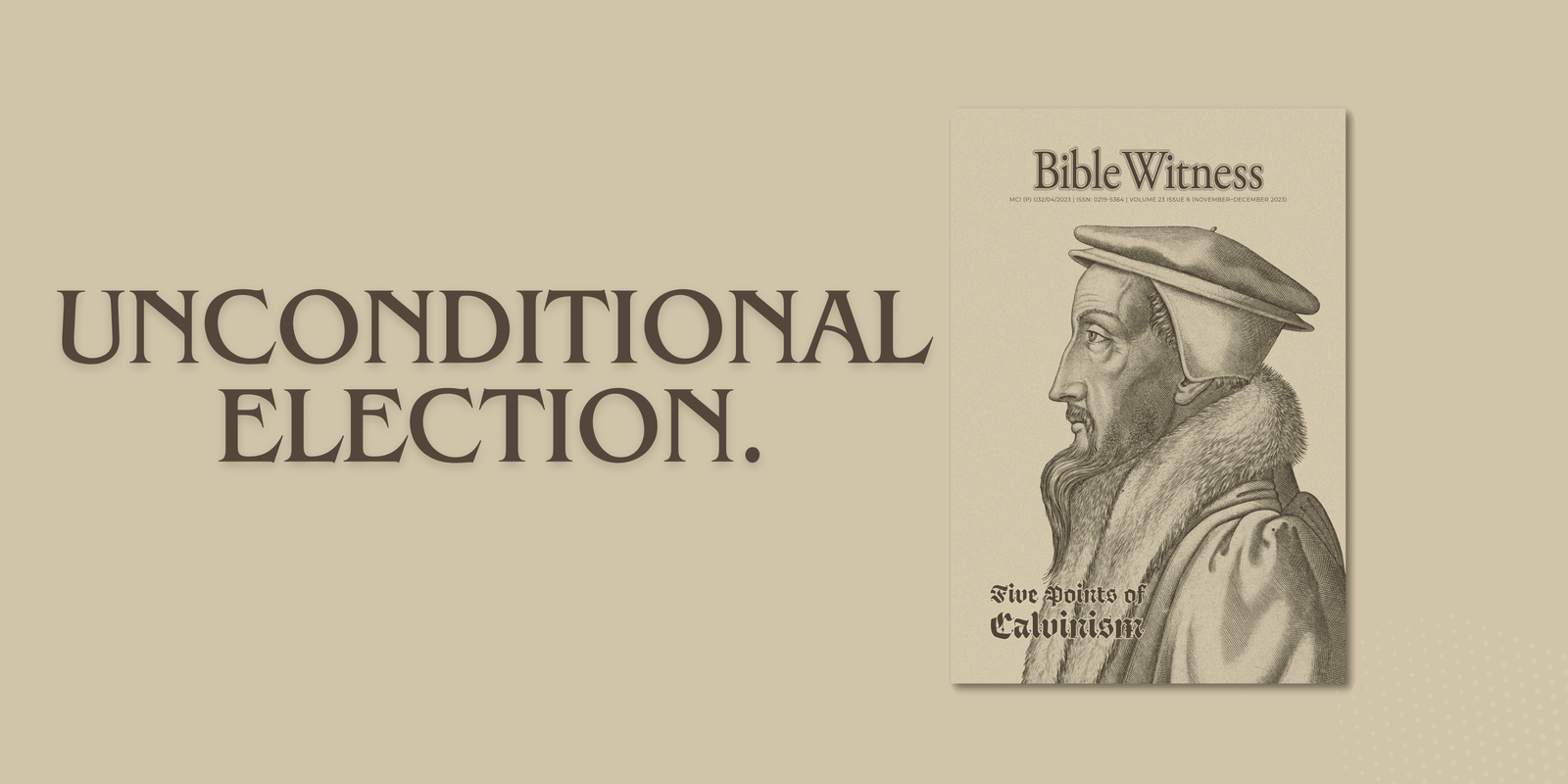What is Election?
Election is God’s sovereign and gracious choosing of some to be saved. Scripture clearly teaches this doctrine, such as in Ephesians 1:4 “According as he hath chosen us in him before the foundation of the world ” It is clear that election precedes salvation. God the Father elected some unto salvation before the history of the world began, whereas salvation takes place in the course of one’s life when one confesses Jesus as Saviour and Lord (Romans 10:9–10). Few Christians would deny the doctrine of election, as it is easy to understand that God sovereignly chooses some (not all) to be saved. However, there is great disagreement as to whether God’s election is pre-conditioned on man’s supposed favourable response to the offer of salvation.
Conditional Election?
Some understand “election” to mean that God does so based on certain conditions. God elected those whom He knew would express their faith with repentance and obedience. This is part of the Arminian view of salvation, which asserts that in His divine foresight, God looked down through the corridors of time and elected all those who would, in their lifetime, believe in Jesus for salvation. Having this divine foreknowledge, God thus confirmed and sealed their belief in Jesus by electing them. Romans 8:29 is frequently used to support the view on conditional election: “For whom he did foreknow, he also did predestinate to be conformed to the image of his Son…” Proponents quickly point to the word “foreknow” and explain that since God knew who would believe and who would not, He predestinated those whom He knew would believe. The terms “ratify” and “confirm” are often used to explain the Arminian understanding of conditional election. God “ratified” and “confirmed” those He knew would believe in Him by electing them. God knew ahead of time these persons’ future expression of faith, repentance and obedience, and thus He predestinated them to confirm them in the faith. Therefore, according to Arminianism, election is God’s confirmation of those who will believe in the Saviour.
Fallacy of Conditional Election
First, that is not what election means! Election is God’s choosing, not God’s confirming of what man chooses. The understanding that election is conditional compels us to interpret “election” as God’s confirmation of man’s choice of God. Now, how should we understand the word “foreknow” in Romans 8:29? God’s foreknowledge has to be understood in the context of God’s purpose. The preceding verse (Romans 8:28) centralizes the sovereignty of God’s will: “And we know that all things work together for good to them that love God, to them who are the called according to his purpose”. Those who love God are called according to God’s purpose. They love God not according to their own purpose and works. Thus, in the next verse, when the apostle Paul refers to those whom God foreknew, this group of people are the same ones who were first called according to God’s sovereign purpose. God first chose and called His people according to His purpose. God’s election comes first, independent of man’s response! In 2 Thessalonians 2:13, we find the unmistakable order, “God hath from the beginning chosen you to salvation through sanctification of the Spirit and belief of the truth”. God chose us unto salvation. The order is clear: God’s election precedes our response to the offer of salvation, as well as our commitment to sanctification and obedience to His Word. Second, election is God’s choosing of some, and not man’s choosing of God. This issue at stake is who has the sovereign right to choose? Scripture teaches that the sovereign God has that uncontested right, and His election was not determined by or conditioned upon any virtuous quality or act foreseen in man. The twin sons of Isaac and Rebecca are a case in point. Under divine inspiration, Paul reminds us, “(For the children being not yet born, neither having done any good or evil, that the purpose of God according to election might stand, not of works, but of him that calleth;) it was said unto her, The elder shall serve the younger. As it is written, Jacob have I loved, but Esau have I hated” (Romans 9:11–13). Herein Scripture makes it clear that God’s election does not hinge upon any fulfillment of condition imposed on man, thereby exposing the fallacy of conditional election. Third, depraved man is unable to choose God on his own. Man being born in sin, can he choose God on his own? No, man is corrupt and has no innate ability to choose God. It must be noted here that the freedom to make regular life decisions is not under question, for man makes choices every day. The question lies at a deeper level—does man have the complete freedom and ability to choose God? John 1:12 clearly shows the answer to be in the negative: “But as many as received him, to them gave he power to become the sons of God, even to them that believe on his name”. Without God-given ability, depraved man simply cannot choose God. All are conceived in sin (cf. Psalm 51:5), born spiritually dead, and are incapable of doing anything that pleases God (cf. Ephesians 2:1; Romans 8:7–8). None of us can believe and be “sons of God”, if God did not first choose us. Our salvation is the result of God’s choice, even before the foundation of the world.
God’s Unconditional Election of Sinners
Unconditional election means God did not foresee an action or condition on our part that would induce Him to save us. Unconditional election rests on God’s sovereign decision to save whomever He is pleased to save. The prophet Jonah acquiesced, in recognition of God’s sovereign decision to pardon the city of Nineveh, “Salvation is of the LORD” (Jonah 2:9). As a point of clarification, unconditional election is not unconditional salvation, for only those who believe in His Son have everlasting life (John 3:15). Confessing Jesus with a believing heart is a sure requirement and proof of salvation (1 John 4:15). Unconditional election states that man has no sway on God’s choosing, and this is eloquently expressed in the Westminster Confession of Faith (WCF): “Those of mankind that are predestinated unto life, God … hath chosen … without any foresight of faith or good works, or perseverance in either of them, or any other thing in the creature, as conditions, or causes moving Him thereunto; and all to the praise of His glorious grace” (WCF chapter 3, section 5). Why, then, did God choose some to be saved? Scripture explains that God “predestinated us … according to the good pleasure of his will” (Ephesians 1:5; cf. 1:9). It is God’s fair and faultless delight to choose some unto salvation. None could say it is unfair or infelicitous on God’s part to choose some and pass over others. God exercises His sovereign authority over man. None can question the Creator. God’s unconditional election is incontestable, for He declares, “I will have mercy on whom I will have mercy, and I will have compassion on whom I will have compassion” (Romans 9:15; cf. 9:16–23).
Our Response
What can we say in response to God’s unconditional election? “Is there unrighteousness with God? God forbid” (Romans 9:14), Paul is quick to rule out this unacceptable response. Being totally depraved, none of us is worthy to receive His lovingkindness. Yet, “God, who is rich in mercy, … hath quickened us together with Christ, (by grace ye are saved;)” (Ephesians 2:4–5). Since it is all by God’s grace, we are taught by Scripture to respond with praise for His grace—“To the praise of the glory of his grace, wherein he hath made us accepted in the beloved” (Ephesians 1:6). Our knowledge of God’s unconditional election should also empower and confirm our work of evangelism. We see this impetus in Paul’s writing to Timothy amid deep persecution—“Therefore I endure all things for the elect’s sakes, that they may also obtain the salvation which is in Christ Jesus with eternal glory” (2 Timothy 2:10). A proper understanding of the doctrine of election encourages evangelism and guarantees its success. It overcomes the fear of failure when sharing the Gospel, and empowers believers to remain faithful to the message in times of great persecution. For they know that the power lies in the Gospel message and in God’s sovereign election, not in their own feeble presentation. God intervenes in the lives of the elect and works through the Holy Spirit so that they willingly respond in faith to Him, for they are His sheep who will “hear my voice … and they follow me” (John 10:27). As for the non-elect, in not acknowledging Him as God, “they are without excuse” (cf. Romans 1:18–20); consequently they receive the just punishment due to them. A right understanding of God’s unconditional election should result not in questioning God’s justice, but instead in marvelling at and praising God for His great mercy!
Written by Cornelius Koshy.
This article is from Bible Witness Magazine Volume 23 Issue 6, “Five Points of Calvinism”.
Read now :- Bible Witness Magazine



